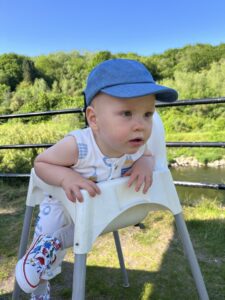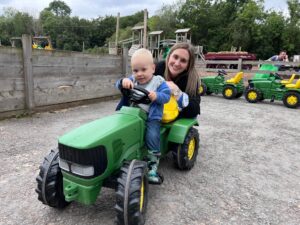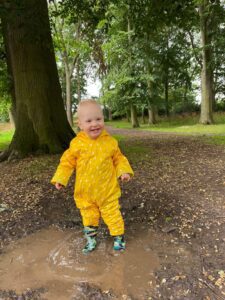Isaac & our Trustee, Rebecca
I came into contact with Spoons during the time our little boy, Isaac, spent on the neonatal unit at Wythenshawe Hospital.
Isaac was born by emergency c-section on 28th September 2021, at 30 weeks and 2 days. I had gone into hospital the day before with reduced movements and was placed under monitoring. Initially everything seemed to be fine, but after a while Isaac’s heart rate dropped dramatically and we were kept in overnight. This happened on several more occasions overnight, and in the morning the decision was made to deliver him. He was born weighing 3lbs 4oz, and we spent nearly 9 weeks in total on NICU; the first couple of days at St Mary’s before being transferred to Wythenshawe.
At Wythenshawe I met Cat and Hayley, peer support volunteers from Spoons.
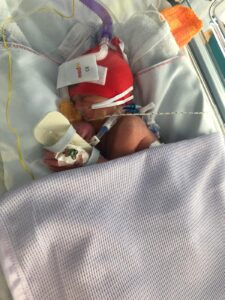 Their visits to the unit were invaluable for me. I’m lucky to say that we had an incredibly supportive network of family and friends who did so much to help us through our neonatal journey. However, it is very difficult to communicate what you experience on a neonatal unit to someone who has never been through it. As a result, talking to people who had been there and knew exactly what we were going through was so important. I remember in particular a day when Isaac was particularly unwell and we’d been told that he would need a blood transfusion.
Their visits to the unit were invaluable for me. I’m lucky to say that we had an incredibly supportive network of family and friends who did so much to help us through our neonatal journey. However, it is very difficult to communicate what you experience on a neonatal unit to someone who has never been through it. As a result, talking to people who had been there and knew exactly what we were going through was so important. I remember in particular a day when Isaac was particularly unwell and we’d been told that he would need a blood transfusion.
The very idea of our tiny baby needing to go through this was terrifying, but Hayley was in the unit that day and had experience of her children going through the same. Talking to her made us feel so much better and helped us through a very tough day.
Spoons continued to be really important to us after discharge, particularly for me. I found re-adjusting to the outside world very difficult, and was incredibly nervous about taking Isaac out and about. I was terrified that he’d catch something and end up back in hospital – and this wasn’t helped by us being discharged just as Omicron was starting to become an issue! I realised that I needed some help one day a few weeks after we’d been discharged, when my husband (very supportively!) told me how well I’d done for managing to take Isaac for a short walk around the block. As someone who had always been incredibly busy and sociable, the idea that my life had been reduced to a short walk being a huge achievement was a bit of a wake up call. I spoke to Spoons and within days had a counselling appointment with the lovely Janine, who helped me to start building up to something that resembled normality! Spoons messy play classes were the first baby groups I took Isaac to, as I had the confidence of knowing that people would understand if I was a little bit nervous about close contact and so on.
Spoons means a huge amount to me and my family. The charity has been there for us at every stage of our neonatal journey, and I’m not sure where we’d be without the support that we’ve received!
I have now joined the Spoons board as a Trustee of the charity. I felt really strongly that I wanted to pay forward the support that we received to other neonatal families. I think other NICU parents would agree that the experience is completely life-changing and it becomes such a huge part of your identity. I feel that NICU families are very much a community, and find I comfort and belonging in making connections with other people who have been through the same experiences as us. I hope that as part of my role as a Trustee, I can help Spoons to continue to provide families like mine with the same support and assistance that we have received.
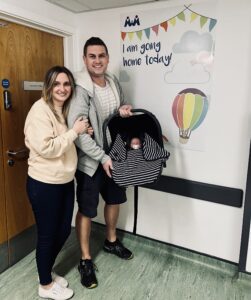 There are various obvious challenges that come with a neonatal experience – including the trauma and unexpected nature of an early birth or having a baby born unwell; the ongoing medical issues; not knowing when you will be discharged; navigating what your partner does about work while your baby remains in hospital.
There are various obvious challenges that come with a neonatal experience – including the trauma and unexpected nature of an early birth or having a baby born unwell; the ongoing medical issues; not knowing when you will be discharged; navigating what your partner does about work while your baby remains in hospital.
However, I think the biggest misconception that people who haven’t been through the NICU themselves have is that once you get home, everything’s ok.
We’ve had (undoubtedly well meaning) people say things like ‘well at least he’s home now and you can forget all about it’ or ‘you’d never know now would you’ or ‘you just have to treat him like a ‘normal’ baby now’. Firstly, premature babies are clinically more vulnerable than babies born at full term without any complications. The advice you are given on discharge is to be very careful to avoid people with colds and flu. This can be really difficult, particularly when people think you’re being over protective or over the top, and when people have waited so long to be able to meet the little one. Secondly, for parents, there is no ‘forgetting’ that experience. It shapes who you are as a parent and can make you very anxious about all sorts of things. For me, I still find it very hard to leave Isaac and adjustments to things like starting nursery have been difficult for me from a mental health point of view.
This is one of the biggest challenges about the time your baby is on the unit – having to leave them there, because you can’t be there all time. We were so lucky that Isaac received the most incredible care at Wythenshawe, and are forever grateful to all the doctors and nurses there for everything they did for him and us.
But it is simply the most heart-wrenching thing to leave your newborn baby with anyone, for any length of time. There simply isn’t the provision in the NHS for parents to stay with their babies on neonatal units, and that was an incredibly tough part of the process for us.
If I was to offer any advice to others going through this experience, it would be to remember to look after yourselves as well as your baby.
This is advice that I struggled to take at the time, but looking back I would tell myself it IS ok to have a break, you DO have to eat, you DO have to shower, you DO have to rest and recover from the birth. When people ask if they can help you, take them up on it. You need food, you need things to be done at home and your friends and family feel a bit useless and will be glad of the opportunity to do something for you.
And finally, reach out to the wider NICU community and get support like that available from Spoons. It’s a tough journey but there are a lot of people who’ve been through it and are there to help you do the same.
